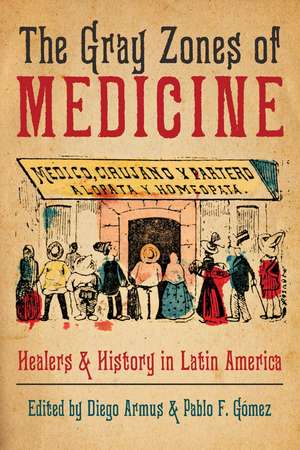The Gray Zones of Medicine: Healers and History in Latin America
Editat de Diego Armus, Pablo F. Gómezen Limba Engleză Hardback – 14 sep 2021
Health practitioners working in gray zones, or between official and unofficial medicines, played a fundamental role in shaping Latin America from the colonial period onward. The Gray Zones of Medicine offers a human, relatable, complex examination of the history of health and healing in Latin America across five centuries. Contributors uncover how biographical narratives of individual actors—outside those of hegemonic biomedical knowledge, careers of successful doctors, public health initiatives, and research and medical institutions—can provide a unique window into larger social, cultural, political, and economic historical changes and continuities in the region. They reveal the power of such stories to illuminate intricacies and resilient features of the history of health and disease, and they demonstrate the importance of escaping analytical constraints posed by binary frameworks of legality/illegality, learned/popular, and orthodoxy/heterodoxy when writing about the past. Through an accessible and story-like format, this book unlocks the potential of historical narratives of healings to understand and give nuance to processes too frequently articulated through intellectual medical histories or the lenses of empires, nation-states, and their institutions.
Preț: 393.42 lei
Nou
Puncte Express: 590
Preț estimativ în valută:
75.28€ • 78.76$ • 62.54£
75.28€ • 78.76$ • 62.54£
Carte disponibilă
Livrare economică 13-27 martie
Preluare comenzi: 021 569.72.76
Specificații
ISBN-13: 9780822946854
ISBN-10: 0822946858
Pagini: 296
Ilustrații: 14 b&w illustrations
Dimensiuni: 152 x 229 x 30 mm
Greutate: 0.54 kg
Ediția:1
Editura: University of Pittsburgh Press
Colecția University of Pittsburgh Press
ISBN-10: 0822946858
Pagini: 296
Ilustrații: 14 b&w illustrations
Dimensiuni: 152 x 229 x 30 mm
Greutate: 0.54 kg
Ediția:1
Editura: University of Pittsburgh Press
Colecția University of Pittsburgh Press
Recenzii
"An interesting, original and well-researched work on the various facets of unconventional medicine in Latin America."
—Bulletin of Spanish Studies
“Diego Armus and Pablo Gómez curated a great collection of essays. . . . The chapters’ short length, vignette style, and focus on ordinary people within broader historical contexts also makes these chapters excellent resources for teaching about the history of health and medicine and the experiences of people that defy easy categorization in Latin America.” —Latin Americanist
“The Gray Zones of Medicine not only provides a remarkable and cohesive set of biographies of Latin American healers, ranging from the colonial period to today, the Caribbean to the Southern Cone, but also examines the fraught relationship between these male and female practitioners with the official, licensed world of medicine.”—Charles F. Walker, University of California, Davis
“The Gray Zones of Medicine makes a landmark contribution to decolonizing and decentering the field of the history of medicine. Turning away from categories such as ‘Western medicine’ and ‘popular versus learned medicine,’ the volume explores the complexity of medicine within the context of healers’ own lives and communities. Contributors do not seek to measure how Latin American medicine compared with, or diverged from, so-called Western biomedicine. Instead, they present a rich narrative of how healers moved, worked, and lived within their own worlds—that is, within the ‘gray zones of medicine.’” —Elizabeth O’Brien, Johns Hopkins University
—Bulletin of Spanish Studies
“Diego Armus and Pablo Gómez curated a great collection of essays. . . . The chapters’ short length, vignette style, and focus on ordinary people within broader historical contexts also makes these chapters excellent resources for teaching about the history of health and medicine and the experiences of people that defy easy categorization in Latin America.” —Latin Americanist
“The Gray Zones of Medicine not only provides a remarkable and cohesive set of biographies of Latin American healers, ranging from the colonial period to today, the Caribbean to the Southern Cone, but also examines the fraught relationship between these male and female practitioners with the official, licensed world of medicine.”—Charles F. Walker, University of California, Davis
“The Gray Zones of Medicine makes a landmark contribution to decolonizing and decentering the field of the history of medicine. Turning away from categories such as ‘Western medicine’ and ‘popular versus learned medicine,’ the volume explores the complexity of medicine within the context of healers’ own lives and communities. Contributors do not seek to measure how Latin American medicine compared with, or diverged from, so-called Western biomedicine. Instead, they present a rich narrative of how healers moved, worked, and lived within their own worlds—that is, within the ‘gray zones of medicine.’” —Elizabeth O’Brien, Johns Hopkins University
Notă biografică
Diego Armus is professor of Latin American history at Swarthmore. He is author or editor of half a dozen books on topics related to the history of disease and health, among them The Ailing City: Health, Tuberculosis and Culture in Buenos Aires, 1870–1950 and Disease in the History of Modern Latin America: From Malaria to AIDS.
Pablo F. Gómez is associate professor in the Department of Medical History and Bioethics and the Department of History at the University of Wisconsin, Madison. Gómez’s first book, The Experiential Caribbean: Creating Knowledge and Healing in the Early Modern Atlantic, explores belief making and the creation of evidence around the human body and the natural world in the early modern Caribbean.
Pablo F. Gómez is associate professor in the Department of Medical History and Bioethics and the Department of History at the University of Wisconsin, Madison. Gómez’s first book, The Experiential Caribbean: Creating Knowledge and Healing in the Early Modern Atlantic, explores belief making and the creation of evidence around the human body and the natural world in the early modern Caribbean.
